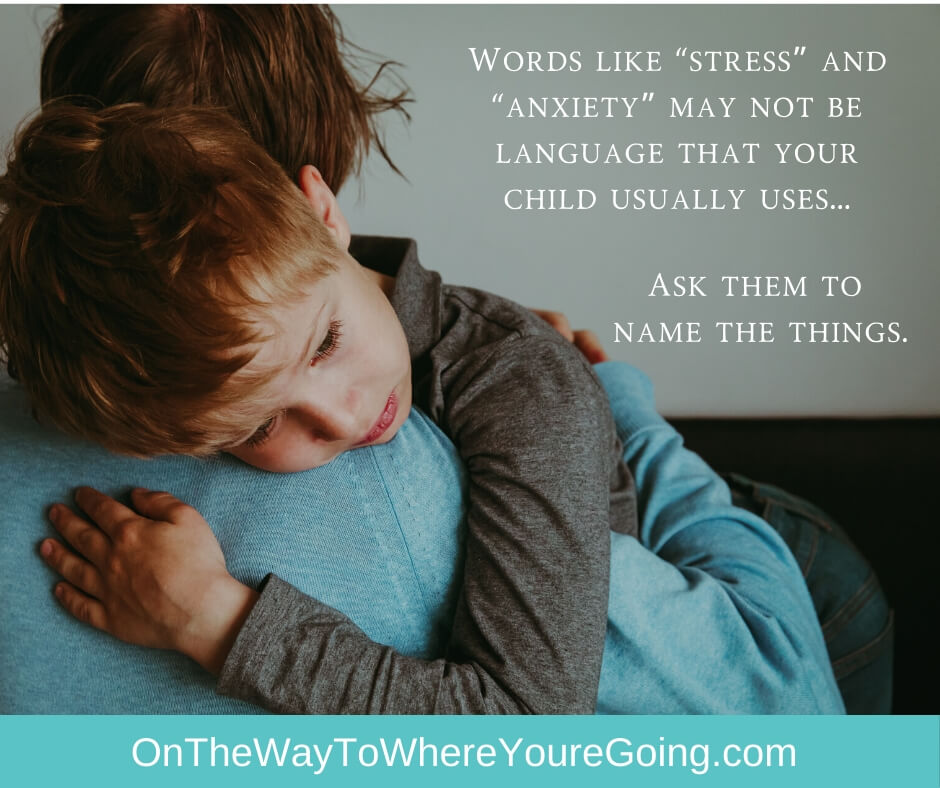“We must Share where we’ve been, where we are, and to where we’re venturing. And, while we’re sharing, we must name all the things.”
In today’s world, challenges abound. People are struggling to find a way to survive during a time of isolation and separation.
Here are four practical steps to help your child find their story during difficult times.
1 – Teach Them How to Acknowledge Their Pain
“All the things…”

Acknowledging our pain may seem simplistic, but it is valuable and often very complex. The truth is, before acknowledging something, we must be aware of its existence.
Often, children are unaware of what’s causing them distress. They may complain of a stomach ache or a headache, not realizing that they’re experiencing stress and anxiety.
Words like “stress” and “anxiety” may not be language that your child usually uses, nor may it be appropriate at the moment. However, teaching them to sit and name “all the things” can be very helpful.
For example, you may ask your child to name what’s different in their life right now. Perhaps, they were excited about Show and Tell and now they can longer share during this special time in their day.
Maybe, they enjoyed playing soccer each Tuesday and Thursday. Is your child missing a prom, a Sweet 16, or another major experience?
Ask them to name it.
Then, ask them how they feel about it… all the things. It’s quite possible that they’re feeling many conflicting emotions in unison.
Even without understanding the significance of what they are doing, naming and acknowledging their emotions can do wonders for the mental, emotional, and physical symptoms they are feeling in response to their current circumstances.
2 – Encourage an Environment of Vulnerability and Openness
“This is where our stories rise.”

One day your child will learn how to acknowledge their experiences without your help. Perhaps, they already do so. But, we want more. We want our homes to be an ongoing welcoming environment of grace and openness.
This is where our stories rise. But, it requires a place of safety and vulnerability.
This starts with us… you and me.
We must share where we’ve been, where we are, and to where we’re venturing. And, while we’re sharing, we must name all the things: the fear, the tiredness, the excitement, and the triumphs.
We must let our children know that we feel it too. We feel frustrated when things aren’t normal. Change can be hard. Sometimes, we feel embarrassed when we’re learning something new and it feels like everyone else already knows it.
Every now and then, disappointment creeps in when we don’t get to do something we’ve been looking forward to. And, it stinks. It makes me feel all the things.
Believe it or not, your vulnerability can make your child feel not so alone. Their feelings of insufficiency begin to dissipate as they realize that older people also experience these same emotions.
It’s the beginning of openness as they begin to feel free to be true to their experiences. When they do, lavish that moment.
Related Post: 5 EAsy Tips For Talking To Your Child When the world Is Chaotic
3 – Help Your Child Decide How They Want to Tell Their Story
“Remind your child that the song’s not over. They get to tell their story.”

Here’s the fun part.
This is where you get the opportunity to empower your child. Look your child in the eye and ask, “So, what do you wanna do?” – Remind them that the story’s not over. It’s just beginning.
Determine today that life doesn’t just happen to you or your child. Your child is an active participant in their life, dictating how their story will be told.
They may not be able to determine the events. Bad things happen, and we can’t always control them. But, your child can challenge how the story’s told. They can be empowered to create a new perspective.
The story could be, “I missed an important season and I’m really bummed.” Or, the story could be, “I’m bummed that I missed an important season, but so grateful that I got the opportunity to create something new during that season.”
That missed Show and Tell? – Perhaps, your child would like to video chat Grandma and Grandpa and tell them all about their special something.
That missed soccer season? – Sounds like someone has plenty of time to hone a skill or trick they’ve been wanting to master.
Prom? – Clear the kitchen floor… here I come! Play the music extra loud. We’re gonna make this one epic! Imagine hundreds hosting a virtual prom together as they rock the night away in their own unique fashion.
Remind your child that the song’s not over. They get to tell their story. One day, they’ll thank you for teaching them to be empowered during difficult times.
Related Post: Allowing the Story of Your Child’s Life to Live On
4 – Watch Resilience Blossom
“You can take one more step.”

Resilience doesn’t occur during the waving of the white flag, nor does it occur in a bubble of denial.
Rather, resilience blooms amidst the rough, rugged edges of struggle and truth. It grows through expectancy and belief that the story will end well. It picks you help and reminds you that you can take one more step.
Resilience empowers. When helping your child find their story during difficult times, remember that your child may not be able to write the story, but they are empowered to tell it.
xoxo,
Rachel
© Rachel Blado www.OnTheWayToWhereYoureGoing.com All rights reserved.
P.S. – Are you struggling with your grief walk? Join my newsletter. You’ll also gain access to helpful resources.



